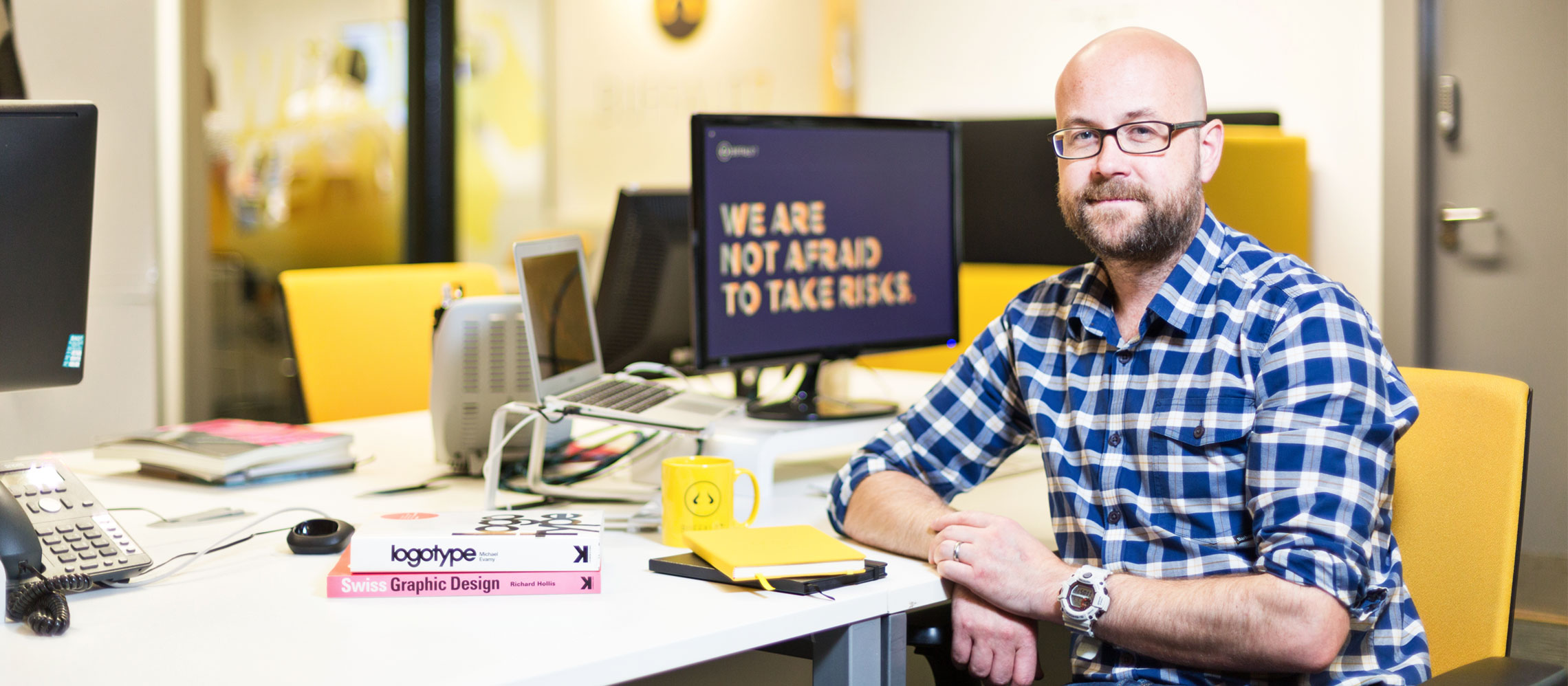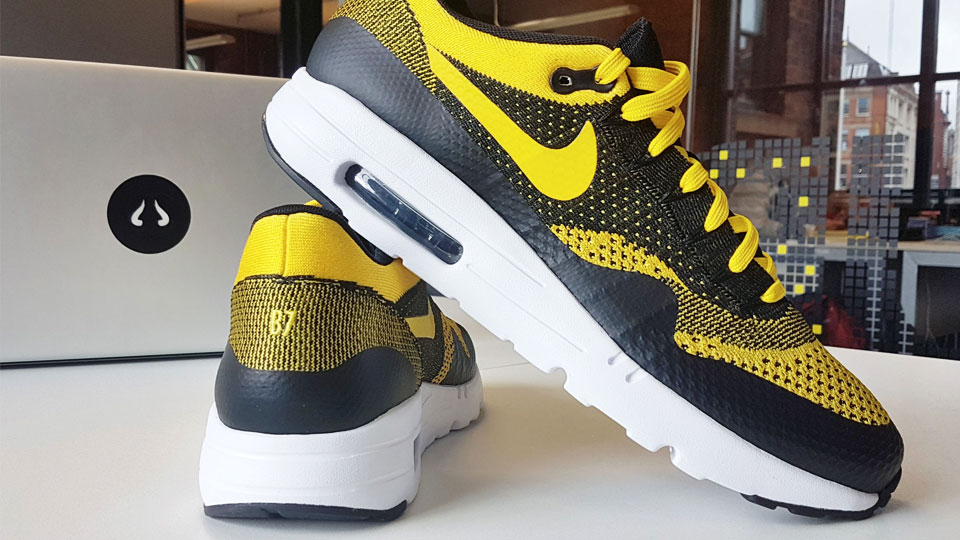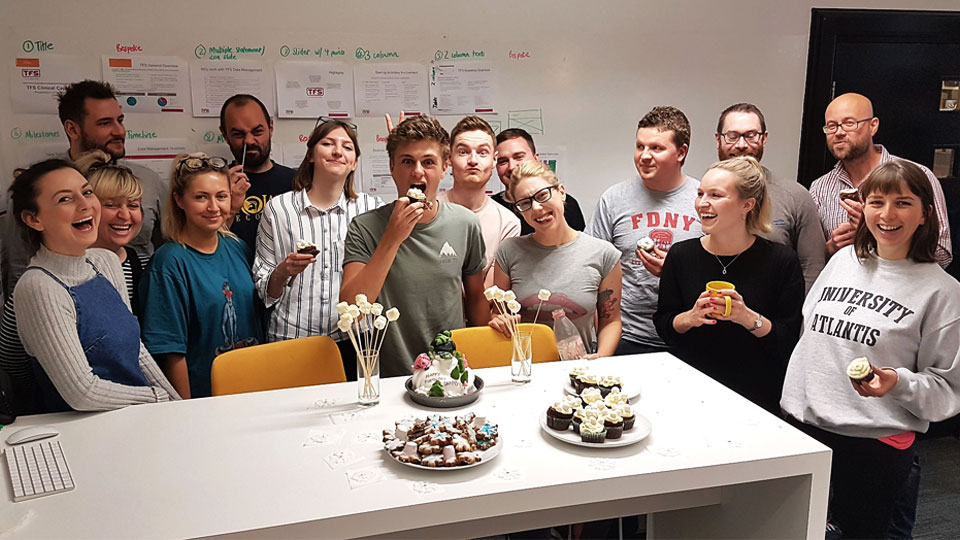We’ve grown enormously in the past couple of years, from 8 to 31 staff in just two years. But where and why did it all start?
I interviewed our Creative Director, Richard Barnes, to shed some light into our early days, what it’s like working at Buffalo 7 and his thoughts on the world of design.
How did you get into design?
“From my teens, I always wanted to be a designer – I had no interest in academia, but loved art. We didn’t have computers back then, so everything was created from scratch meaning that mistakes were raw and often permanent. I wasn’t exposed to graphic design and the works of people like David Carson until my foundation course. It blew my mind, and suddenly everything was brought into sharp focus. I started to see design everywhere I went – my Nike trainers, my album covers, intro graphics on films, t-shirts – it was everywhere and it was utterly absorbing.”
Tell us about your career..
“I spent my twenties working in big media agencies on pitches helping the agency to bring their pitches to life and make presentations stand out from the crowd. I wasn’t lucky enough to have the traditional luxury and mentorship of a creative director, which is both a blessing and a curse. I joined the agencies as the first graphic designer they had, and the more we showed how design could help them, the bigger the design team grew.”
“After 10 years, I missed the time on a brief to actually really think about the designs I was creating, so I left to go freelance.”
And then you set up Buffalo 7 – how did this come about?
“I really liked the idea of starting something myself. I took inspiration from my father who was his own boss for years and it made me see how you can truly shape your own destiny. Did I know much about setting up a business? No! But it was something to figure out as I went along.”
“I survived about two weeks working on my own at home. I really missed the social aspect and collaborations of a working environment so I rented a desk at a busy studio with other freelancers. It was 2009 and Buffalo 7 was born – work started to flow quickly. I had a reputation as someone that was an expert in really well-designed PowerPoint and despite being a one-man-band, I won Microsoft and UEFA Champions League pitches against some of the big London agencies like Ogilvy and Saatchi. The big accounts gave me the freedom and stability to hire some staff and also take on some less paid but equally rewarding design projects.”
“Today, as the UK’s leading PowerPoint presentation design agency, Buffalo 7 has offices in Manchester, London and Yorkshire. In just two years, the number of staff has increased from eight to 31, with turnover for 2017 forecast to hit £1.6m. We work with leading names such as Dell, Red Bull, Facebook and the BBC as well as a host of other SMEs and have plans to open offices internationally. Exciting times!”
What sets Buffalo 7 apart?
“Our agency has the ‘can-do’ culture that is a must for any client work. We’re not afraid of challenges and we don’t want to stand still. What makes us different is we tackle PowerPoint like any other design work. I find it hilarious people think that PowerPoint is the problem ‘death by PowerPoint’ etc. It’s what goes in it that makes it amazing or terrible. PowerPoint has become the villain for people’s failings to plan, design and build slides that communicate effectively and beautifully. We’re technical experts with the software, but it’s our design that makes our presentations awesome. It’s rewarding to hear, regularly, clients ask if it’s even PowerPoint anymore.”
What’s it like working at Buffalo 7?
“I’ve always made sure that culture is the heartbeat of the agency – everyone works with everyone, teams mix and match and we all have a voice. We celebrate success as a team. We have breakfast together every morning. Birthdays are crazy. Going out with your team is essential and regular. We regularly share ideas with each other. As a result, our teamwork and design work goes from strength to strength and I’m constantly amazed at the quality of work leaving the studio. It’s amazing and very rewarding to watch other designers delivering great work and be part of the process.”
What do you look for in people seeking a job with Buffalo 7?
“From a recruitment perspective, we look for people in interviews who have a natural spark. They usually don’t really know what we do, but once they see it, they get excited. Qualifications aren’t really important and most of the time you can spot in a designer’s portfolio a love for clean, clear communications and a gift for layouts. We help people simplify their messages so our designers all tend to have a ‘neat streak’ in their work. As the whole team work together on a daily basis, half the interview is really just seeing if they’d fit in, how forthcoming they are, would they be able to take bad feedback on the chin etc. Getting the mix right is important for steady studio growth.”
How have you seen design change in your career?
“At uni, believe it or not, we had six Macs for 300 students. In my final year, things shifted, and we got a computer lab and design just started to explode both on campus and online. Not having a computer to begin with made us very resourceful, but adding a computer gave us the ability to do things more quickly and gave us more programs to experiment with. Once the internet kicked in, it gave creatives more ways to find inspiration, share ideas, find things and enable the ability to collaborate.”
What were the challenges in your career?
“In my earlier career, without the mentorship of a creative director, I had to work a lot out for myself, lead by example and trust my gut. We’d do whatever it took to win. We wouldn’t go home for days, we’d make half the agency dress up as characters to welcome the client, we’d shoot and edit videos ourselves learning stuff as we went, we’d make and remake mocks ups, pitch decks and documents again right up to the wire. We knew people would get swept up in the excitement of it all if we generated it and created a team spirit that was through the roof.”
What have you learnt?
“Setting up a business was a big trial and error process, you simply just go for it and back yourself. All you need is your Mac and a total ‘can-do’ attitude. If you love challenges, you’ll love working for yourself. There’s a ton of stuff to learn but there’s lots of people that can help you too, friends, mentors, books, and resources to help with the organisational and accounting side of things. I’m a firm believer in ‘love what you do’ – then you’ll do good work which will keep the phone ringing and consequently the financial side will take care of itself.”
What’s changed in the industry the most since you started out? For better and for worse?
“Computers and the Internet. There’s so much out there now that you can find out absolutely everything which can be a real blessing but you can also sometimes get a little lost in the woods which can be a curse.”
What are you currently reading?
“I’m currently reading a handful of books (although with a 1-year-old daughter I find spare time has definitely shrunk!). I’m halfway through: ‘Design Your Life‘ by Vince Frost; ‘e2‘ by Matt Beaumont; and ‘Airside‘ by Airside.”
Finally, what advice would you give to those thinking about starting their own studio?
“I say to everyone, if you’re unhappy you should do something about it. Working for someone else is hugely rewarding, simple and relatively stress free. The problem is you probably have no control over what and how the agency will run. Freelancing is relatively simple, if you’re happy to stay as a one-man-band, you have lots of freedom but it can be a bit of a feast or famine. Going to the next step and setting up a studio on your own is a huge daunting challenge, but will provide you with pure creative freedom and push you into areas of life that can be equally fun and challenging. I’d strongly recommend not doing it on your own.”
“Two heads are better than one and you’ll want another person to share decisions, tricky situations, cover you when you need a break etc. The reality is you can’t do everything, and it helps to play to each other’s strengths and experiences – in a nutshell, someone needs to do the work and someone needs to find the work. No-one said it would be easy, but the bigger the personal risk, the bigger the personal reward to watch something you’ve created grow.”
Follow us on Instagram to delve further into the world of Buffalo 7 #WeAreBuffalo7





